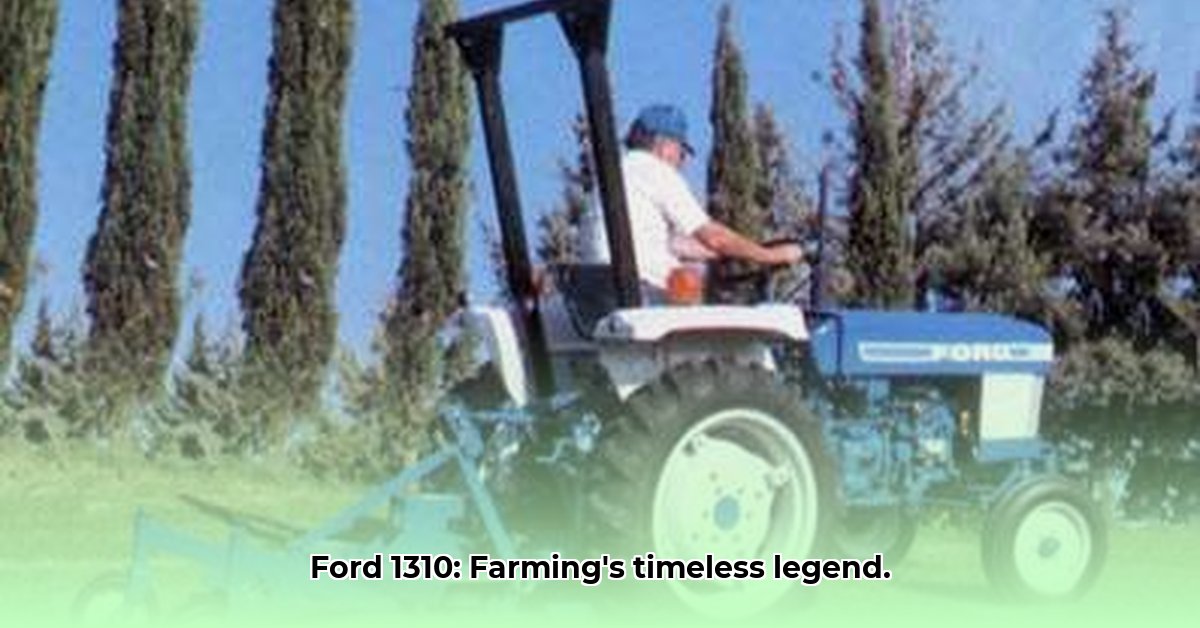
Ford 1310 Tractor: A Look Back at a Compact Workhorse
The Ford 1310 tractor, a compact machine produced by Shibaura for Ford from 1983 to 1986, represents a significant, albeit often overlooked, chapter in agricultural history. While lacking the advanced features of modern tractors, its attributes offer valuable insights into sustainable farming practices and the evolution of agricultural technology. Its compact design and modest power output, surprisingly, contribute to its unexpected relevance in today's environmentally conscious farming landscape. For more on Ford tractors, check out this useful resource.
The Ford 1310: A Closer Look at This Little Workhorse
Equipped with a 19-horsepower engine (a respectable figure for its era), the Ford 1310 was well-suited for smaller farms and diverse tasks. Its compact size minimized soil compaction, a crucial factor in maintaining long-term soil health and productivity. This understated workhorse provided efficient and effective performance, making it a practical and reliable choice for many farmers. Isn't it fascinating how a seemingly simple machine can have such a lasting impact?
Under the Hood and On the Job: Specifications and Capabilities
The 1310 featured a 6.9-gallon fuel tank and a 4.5-gallon hydraulic system. While modest by modern standards, these specifications highlight the focus on fuel efficiency prevalent in its design. Its versatility stemmed from its ability to accommodate various implements via its power take-off (PTO) system, allowing for tasks like plowing, mowing, and even snow removal.
Sustainability and the Ford 1310: Unexpected Connections
While not explicitly designed with sustainability in mind, the Ford 1310's characteristics indirectly support sustainable farming principles. Its compact size minimized soil compaction, and its relatively simple mechanics enabled easier, potentially DIY, repairs, reducing reliance on specialized mechanics and associated emissions. But how does it compare to modern, inherently sustainable designs?
The Ford 1310 vs. Modern Marvels: A Tale of Two Tractors
Modern tractors boast advanced technologies like GPS guidance for precision farming, automated operations minimizing waste and fuel consumption, and substantially more powerful, fuel-efficient engines. These advancements significantly enhance efficiency and reduce environmental impact. However, the 1310's simplicity offers an alternative perspective, representing a closer, more hands-on relationship between farmer and machine. What are the trade-offs between modern technology and simpler, more robust mechanics?
The Enduring Legacy: Lessons from the Past
The Ford 1310's enduring legacy lies in its demonstration of agricultural technology's evolution. Its simplicity and fuel efficiency, when contrasted with modern tractors, provide valuable insights for current manufacturers. Could its straightforward design offer inspiration for incorporating similar principles into modern sustainable tractor designs?
Considering the Ford 1310 in Today's World: A Practical Assessment
| Factor | Considerations |
|---|---|
| Availability | Finding a used Ford 1310 may be challenging; parts availability is limited. |
| Maintenance | Simple design allows for manageable DIY repairs; however, finding parts is difficult. |
| Sustainability | Minimizes soil compaction, uses less fuel, but lacks modern sustainable features. |
| Cost | Lower initial purchase cost than modern tractors, but maintenance could be expensive. |
The Ford 1310’s story highlights the ongoing quest to balance productivity with sustainable practices, representing a critical juncture in the evolution of agriculture.
How to Adapt a Ford 1310 Tractor for Modern Sustainable Farming
Can a vintage tractor find its place in modern, sustainable agriculture? The Ford 1310's robust build and simple design make it a surprisingly viable option, particularly for small-scale farmers. However, adapting it requires addressing specific challenges.
Maneuverability Matters: Tackling the Front-End Loader Challenge
One key issue involves decreased maneuverability when a front-end loader (FEL) is attached. The added weight significantly impacts handling, increasing soil compaction. How can we mitigate this?
Several solutions exist: Aftermarket power steering kits improve maneuverability, but increase cost and potential compatibility issues. Adjusting the FEL's weight distribution, adding counterweights, provides a less costly alternative, though its effectiveness may be limited.
Sustainable Modifications: A Cost-Benefit Analysis
| Modification | Pros | Cons |
|---|---|---|
| Aftermarket Power Steering | Improved maneuverability, reduced driver fatigue | Increased cost, compatibility issues, potential impact on fuel economy |
| FEL Weight Redistribution | Relatively inexpensive, simple implementation | May not fully resolve the issue, requires mechanical skill |
| New, Lighter FEL Design | Optimized for the 1310, improved maneuverability, reduced soil compaction | High initial cost, potentially limited availability |
The optimal approach depends on budget and mechanical skills. A thorough analysis is crucial prior to implementation.
Beyond the Steering Wheel: Other Sustainable Adaptations
Beyond steering improvements, other adaptations enhance the 1310's sustainability:
- Lighter implements: Minimize soil compaction and improve fuel efficiency.
- Precision farming techniques: GPS-guided attachments optimize seeding, fertilizing, and spraying.
- Alternative fuels: Explore biodiesel for a greener approach (though not directly related to the tractor itself).
Remember: adapting an older tractor is about creating a holistic, environmentally conscious system.
A Word on Safety
Always prioritize safety. Modifications must meet safety standards. Improper installations can lead to accidents. Consult qualified mechanics and exercise caution.
Key Takeaways:
- The Ford 1310, with modifications, can be a valuable asset in sustainable farming practices.
- Improved steering is crucial for reduced soil compaction and enhanced efficiency.
- Several upgrade options exist, each with its own cost-benefit profile.
- Sustainable farming extends beyond the tractor; consider lighter implements and precision techniques.
- Safety is paramount during the modification process.